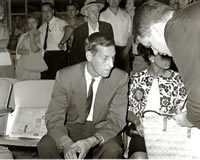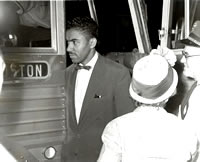UALR Marks 50th Year of Little Rock Freedom Riders
The five young people aboard the Trailways bus traveling from St. Louis to New Orleans didn’t expect trouble when they rolled into Little Rock that hot, muggy day 50 years ago on Sunday, July 10.
The Freedom Riders, civil rights activists volunteering to test a court order to integrate transportation facilities, didn’t know that the bus route had been printed in the local newspaper.
 A crowd of white people, still reeling from the 1957 Central High School Crisis, were ready for a confrontation. Despite efforts by a group of leading Little Rock businessmen urging calm, the city police chief declined to disburse the crowd and instead arrested the riders.
A crowd of white people, still reeling from the 1957 Central High School Crisis, were ready for a confrontation. Despite efforts by a group of leading Little Rock businessmen urging calm, the city police chief declined to disburse the crowd and instead arrested the riders.
At 2 p.m. Sunday, July 10, under the shade trees at the Old State House, the University of Arkansas at Little Rock and its new Institute on Race and Ethnicity – along with the city of Little Rock and the Clinton Foundation – will mark the historic integration ride at the 1961 Freedom Riders 50th Anniversary Celebration.
With a local church choir singing the music of the movement and old-fashioned commemorative fans to set the mood, the event will commemorate the bus ride and honor the five Freedom Riders who braved the mob 50 years ago to help integrate the segregated Trailways Bus Terminal.
Arkansas Gov. Mike Beebe, UALR Chancellor Joel Anderson, former U.S. Secretary of Transportation Rodney Slater, and John Curtis Raines, a Freedom Rider arrested 50 years ago in Little Rock, will be on hand.
Also attending will be the family of the Rev. Benjamin Elton Cox, leader of the Little Rock Freedom Riders who died recently, and civil rights activists who were members of Arkansas’s chapter of the Student Nonviolent Coordinating Committee.
Anderson will use the occasion to introduce Adjoa Aiyetoro, new director of the UALR Institute on Race and Ethnicity.
During the ceremony, an historical marker at the site of the old Trailways depot will be unveiled, along with a new Civil Rights Heritage Trail that begins on Markham Street across from the former bus station and stretches to the William J. Clinton Presidential Center. Plaques honoring the five Freedom Riders will be placed in the sidewalk to start the trail. In the coming years, plaques honoring 10 more Arkansas civil rights activists will be added annually.
“Those who courageously participated in and supported the Freedom Rides of 1961 brought international attention to the racially-driven inequities and horrors that existed in America,” Anderson said. “We must honor those who placed themselves in harm’s way for the cause of justice and equality in our state and our nation.”
The five white and black Freedom Riders who came to Little Rock were part of a summer-long effort through the South by the Congress on Racial Equality (CORE) to test a 1960 Supreme Court decision ordering all interstate bus companies to integrate interstate transportation waiting rooms and restrooms. The non-violent bus riders were college students, ministers, housewives, and others who risked being jailed, beaten, or death to desegregate bus stations.
 Their actions not only removed the “Whites” and “Colored” signs at the bus depot, but they helped lead to an orderly and peaceful integration of Little Rock’s downtown lunch counters, Robinson Auditorium, and other segregated public facilities.
Their actions not only removed the “Whites” and “Colored” signs at the bus depot, but they helped lead to an orderly and peaceful integration of Little Rock’s downtown lunch counters, Robinson Auditorium, and other segregated public facilities.
“The sit-ins and Freedom Rides launched the 1960s civil rights movement in the United States and in Arkansas,” said John Kirk, UALR history department chair and Donaghey professor. “The story of Arkansas and the civil rights movement in the 1960s is one that has seldom been told, often overshadowed by the events of the 1957 Little Rock School Crisis. Yet Little Rock and Arkansas have a rich, deep and complex civil rights history that stretches well beyond the events at Central High.”
To explore that history, the UALR Department of History will host the symposium, “Sit-Ins, Freedom Rides, and Beyond: Direct Action and Civil Rights in 1960s Arkansas” from 9 a.m. to 6 p.m. on July 9 at the Mosaic Templars Cultural Center, 501 West 9th St. in downtown Little Rock. The symposium, free and open to the public, will focus on the members of the Arkansas Student Nonviolent Coordinating Committee (ARSNCC) who led sit-in demonstrations at segregated local business in downtown Little Rock during the 1960s. The conference will bring back activists who worked in the state in the 1960s to tell the story in their own words.
The Freedom Ride to Little Rock originated in St. Louis and was supposed to be a scouting trip. The five riders were the Rev. Benjamin Elton Cox, a rider who survived a burning bus at Anniston, Ala., earlier that year; Bliss Ann Malone, a public teacher; Annie Lumpkin, an 18-year-old student; John Curtis Raines, a white pastor from Long Island, N.Y.; and Janet Reinitz, a white homemaker and artist. Their plans were to travel to Little Rock, Pine Bluff, Texarkana, Shreveport, and New Orleans.
A crowd of 400 to 500 people filled Markham Street from the bus terminal to the old Marion Hotel where the Little Rock Peabody now stands to meet the Freedom Riders. No effort was made to disperse the crowd. When the riders took seats in the “white-only” section of the waiting room, they were arrested for breach of the peace by the Little Rock police chief.
Jim Clark, now the deputy city attorney for Rogers and then a copy editor for the Arkansas Gazette, witnessed the event.
“I have never been so impressed with the heroism of a group of people as I was that evening,” he recalled recently. “The rednecks were gathered around, jeering and shouting insults. The Freedom Riders walked with great dignity, ignoring all the taunts, into the bus station, where they were arrested and taken to jail by Little Rock police. It was so sad, and yet so inspirational that there were people who would risk all for equal rights. I felt guilty that I was not with them.”
Photos courtesy Special Collections, University of Arkansas Archives, Fayetteville Special Collections, University of Arkansas Libraries, Fayetteville.